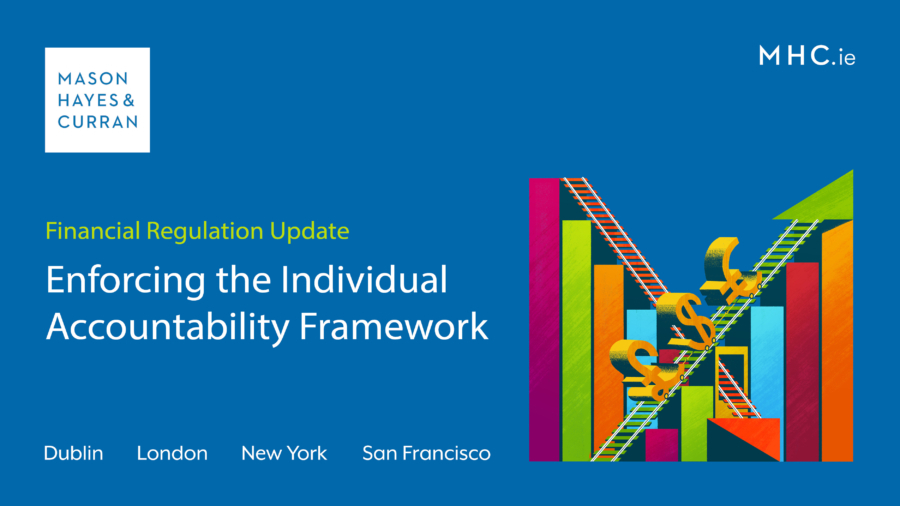Enforcing the Individual Accountability Framework
A balancing act for the Central Bank

With the mechanics of the Central Bank’s individual accountability regime all but settled and implementation well underway, attention has already begun to turn to how the regime will be enforced by the regulator in the future. Our Financial Regulation team outlines some of the notable features relevant to those in the financial services sector.
The Central Bank of Ireland has published the finalised regulations on the Individual Accountability Framework and Senior Executive Accountability Regime (IAF/SEAR) and implementation is already underway. Conduct standards with which individuals must now comply have already come into effect since 29 December 2023.
Understandably, much of the focus amongst the Irish financial services industry has up until now been on ensuring the necessary internal process changes to meet IAF/SEAR requirements. This work will undoubtedly continue as we move towards full implementation of IAF/SEAR.
However, ensuring day-one compliance is not enough. The Central Bank has repeatedly stressed that adherence to the regime is an ongoing expectation of firms. This ongoing expectation is highlighted by the amendments which the new regime has brought to the Central Bank’s Administrative Sanctions Procedure (ASP). It is vital that both firms and individuals have a full appreciation of the enforcement powers now available to the Central Bank.
Talking tough
The ongoing implementation of IAF/SEAR comes amidst a global crackdown from regulators. The European Central Bank, sometimes regarded as having a lighter touch approach to enforcement compared to certain national regulators, has recently issued a warning. It stated that it is ready to make greater use of “supervisory escalation” and that it is prepared to impose daily fines on repeat offenders.
A move towards more aggressive regulation has been welcomed by some senior executives within the industry. In a somewhat surprising move, the head of UBS called for increased personal liability in the banking sector, in the wake of Credit Suisse’s well-publicised struggles. In addition, the collapse of Silicon Valley Bank earlier in 2023 and the steps taken by the Biden administration in seeking further legislative changes in the US that could allow bankers that preside over similar failures to be “held to account” have highlighted the trend towards increased enforcement.
Meanwhile, the UK’s individual accountability framework, the Senior Managers and Certification Regime (SMCR) continues to show its teeth. Most recently, the Prudential Regulation Authority (PRA) fined the former chief executive of Wyelands Bank plc £118,808 for breaching three PRA conduct rules.
In Ireland, IAF/SEAR is popularly described by the media as being designed “to hold bad bankers to account” and was originally recommended by the Central Bank in the wake of the tracker mortgage scandal. This focus on poor customer treatment is of course understandable and disgruntled executives should expect little in the way of public sympathy. However, it is important to remember that the new regime will most profoundly impact approximately 150 in-scope firms out of the 10,000 or so that are regulated by the Central Bank. Of those firms, only 17 are banks, and the remaining 133 in-scope firms are insurance and investment firms. Only a small proportion of these are active in the domestic economy. The regime will therefore impact disproportionately on firms that are providing cross-border financial services from Ireland into other EU Member States and in doing so employing Irish people in positions that could very easily be re-located overseas. It is therefore crucial that the Central Bank stays true to its promises of proportionality when it comes to the enforcement of IAF/SEAR.
Mind the fairness gap
It is clear that the amendments to the ASP introduced by IAF/SEAR have been largely shaped by the concepts of procedural fairness and transparency. Given the criticisms which have been levied at the Central Bank’s approach to enforcement over recent years, this is of course a welcome move.
However, concerns are already being raised that the new enforcement process risks limiting the ability of firms and individuals who find themselves subject to a sanction from the Central Bank to appeal and challenge that decision before the courts. Commentators[1] have made three observations:
- The right of appeal to the Irish Financial Services Appeals Tribunal (IFSAT) has been limited to such an extent that an appeal of a Central Bank decision will now be limited to traditional judicial review grounds and the proportionality of any sanction imposed.
- The right to seek judicial review has been removed entirely. Instead, the investigation subject can only appeal to IFSAT and then the High Court on a point of law, or to contest an application by the Central Bank to confirm a sanction.
- The role of the courts in confirming an ASP finding and sanction sets an exceptionally high bar. The High Court is required to confirm a decision unless it is satisfied that either the Central Bank or IFSAT made an error of law which is manifestly different from the record of the decision, or that any sanction imposed is manifestly disproportionate.
It remains to be seen whether these amendments will hinder the decision-making abilities of the Irish courts regarding the Central Bank’s ASP, and whether they will stand up to possible challenges as to their constitutionality.
Comment
The move towards greater individual accountability undoubtedly has its merits. It will introduce better governance within the financial services sector, whilst also encouraging stronger internal risk management within firms. With that being said, the approach that the Central Bank takes in enforcing the regime, as well as the overall procedural fairness of the ASP, will go a long way in judging whether it is ultimately seen as a success or not.
For more information and expert advice on complying with IAF/SEAR requirements, contact a member of our Financial Regulation team.
The content of this article is provided for information purposes only and does not constitute legal or other advice.
[1] John Freeman BL, vice chair of the Financial Services Bar Association of Ireland
Share this:




